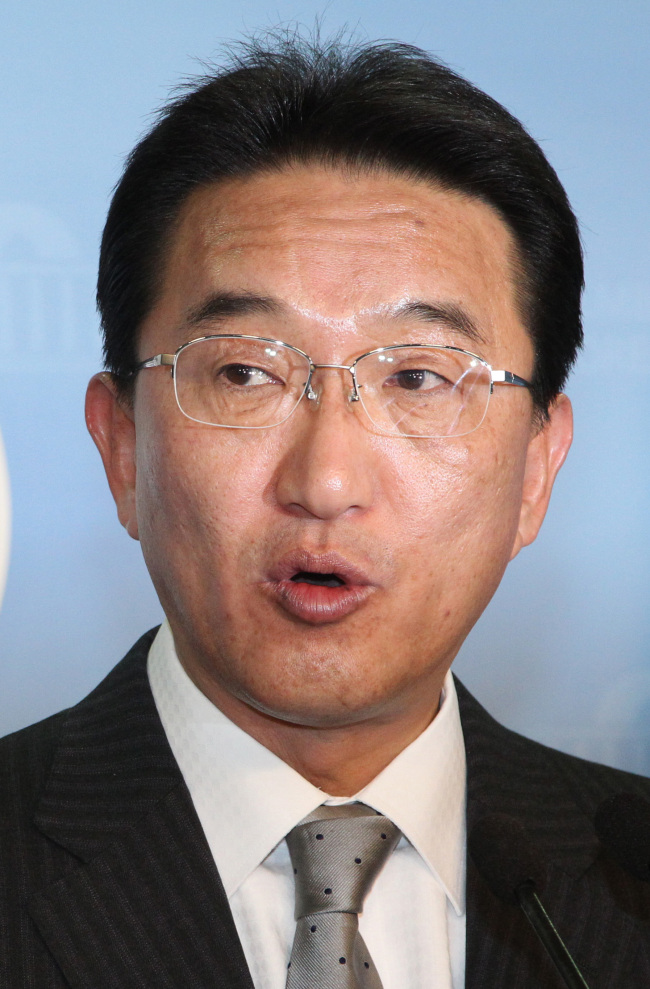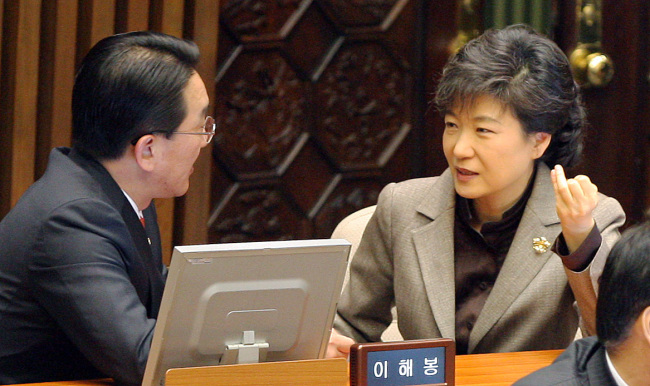President Park Geun-hye’s new top political aide faces the daunting challenges of restoring the frozen relationship between her and her party and putting her reform drive back on track by normalizing communication with the parliament.
Hyun Ki-hwan, a former Saenuri lawmaker and one of the Park’s faithful retainers, was named as the new senior presidential secretary for political affairs Friday.
Though his parliamentary career has been relatively short, Park appointing the one-term lawmaker as her top political aide was seen as a conciliatory gesture to the party, particularly to the party chief Rep. Kim Moo-sung.
Kim and Hyun, both from Busan, are seen as having built close relations over the years, calling each other “brother.”
Citing the amicable relationship between Kim and Hyun, some officials at the ruling party said that his first job at Cheong Wa Dae will be arranging a meeting between the president and the party chief -- a prerequisite for showing the public that they have come to a settlement after the bickering that has roiled the conservative bloc for weeks.
 |
Hyun Ki-hwan (Yonhap) |
Hyun also faces a pressing issue of reactivating stalled trilateral talks among the presidential office, the government and the ruling party.
Park has come under great pressure to support those affected by Middle East respiratory syndrome and revitalize the nation’s economy, which has been hit hard by the public fear over the disease. To do so, she needs to have her bill on a supplementary budget approved by the legislature, and thus the support of the majority Saenuri Party.
Cheong Wa Dae and the Saenuri Party have drifted apart since May, when the Saenuri leadership, then headed by the former party whip Rep. Yoo Seong-min, signed a controversial legislative deal with the main opposition party. Under the deal, the Saenuri Party extracted a promise from the New Politics Alliance for Democracy to pass a reform bill on the civil servants’ pension in exchange for accepting the opposition party’s demand to endorse a revision to a National Assembly law. The bill was to enable lawmakers to challenge the government’s administrative power.
 |
This 2009 file photo shows President Park Geun-hye, the then chairwoman of Grand National Party, talking to Hyun Ki-hwan who was also a parliamentary member. (Yonhap) |
Tensions peaked when Park vetoed the National Assembly Act revision on June 25 and lambasted the Saenuri floor leadership for neglecting their role. It led to weeks of heavy in-house feuding and eventually the resignation of floor leader Rep. Yoo Seong-min last week. Park’s fierce criticism, however, generated strong resistance from her party and bolstered Yoo’s clout.
The interparty feud appears to be settled for the time being after Yoo’s resignation.
However, questions remain whether Hyun, a steadfast pro-Park politician, can bridge the two factions and initiate smooth cooperation with the new Saenuri floor leadership. Rep. Won Woo-cheol, regarded as a nonmainstream lawmaker, is likely to assume the post of Saenuri floor leader, suggesting the power game between the two factions in the party is only beginning.
It is also doubtful whether Hyun will be a versatile enough mediator to resolve the different needs and demands between Park and her party. Upon being named to the position, Hyun described his job as “a mere messenger” to Park, whom he treasures as “a mother-like figure” in his political career.
Hyun was elected for the 18th National Assembly, serving 2008 to 2012. He has been an ardent supporter of Park since she ran for the party’s presidential candidacy in 2007.
Before entering politics, Hyun worked for the Federation of Korean Trade Union, one of South Korea’s two largest labor umbrella groups.
By Cho Chung-un (
christory@heraldcorp.com)








![[Today’s K-pop] Blackpink’s Jennie, Lisa invited to Coachella as solo acts](http://res.heraldm.com/phpwas/restmb_idxmake.php?idx=644&simg=/content/image/2024/11/21/20241121050099_0.jpg)
